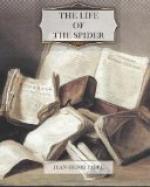Had she to operate according to individual structure, she would need an anatomical dictionary; and instinct is essentially unfamiliar with generalities: its knowledge is always confined to limited points. The Cerceres know their Weevils and their Buprestis-beetles absolutely; the Sphex their Grasshoppers, their Crickets and their Locusts; the Scoliae {34} their Cetonia- and Oryctes-grubs. Even so the other paralyzers. Each has her own victim and knows nothing of any of the others.
The same exclusive tastes prevail among the slayers. Let us remember, in this connection, Philanthus apivorus {35} and, especially, the Thomisus, the comely Spider who cuts Bees’ throats. They understand the fatal blow, either in the neck or under the chin, a thing which the Epeira does not understand; but, just because of this talent, they are specialists. Their province is the Domestic Bee.
Animals are a little like ourselves: they excel in an art only on condition of specializing in it. The Epeira, who, being omnivorous, is obliged to generalize, abandons scientific methods and makes up for this by distilling a poison capable of producing torpor and even death, no matter what the point attacked.
Recognizing the large variety of game, we wonder how the Epeira manages not to hesitate amid those many diverse forms, how, for instance, she passes from the Locust to the Butterfly, so different in appearance. To attribute to her as a guide an extensive zoological knowledge were wildly in excess of what we may reasonably expect of her poor intelligence. The thing moves, therefore it is worth catching: this formula seems to sum up the Spider’s wisdom.
CHAPTER XIV: THE GARDEN SPIDERS: THE QUESTION OF PROPERTY
A dog has found a bone. He lies in the shade, holding it between his paws, and studies it fondly. It is his sacred property, his chattel. An Epeira has woven her web. Here again is property; and owning a better title than the other. Favoured by chance and assisted by his scent, the Dog has merely had a find; he has neither worked nor paid for it. The Spider is more than a casual owner, she has created what is hers. Its substance issued from her body, its structure from her brain. If ever property was sacrosanct, hers is.
Far higher stands the work of the weaver of ideas, who tissues a book, that other Spider’s web, and out of his thought makes something that shall instruct or thrill us. To protect our ‘bone,’ we have the police, invented for the express purpose. To protect the book, we have none but farcical means. Place a few bricks one atop the other; join them with mortar; and the law will defend your wall. Build up in writing an edifice of your thoughts; and it will be open to any one, without serious impediment, to abstract stones from it, even to take the whole, if it suit him. A rabbit-hutch is property; the work of the mind is not. If the animal has eccentric views as regards the possessions of others, we have ours as well.




